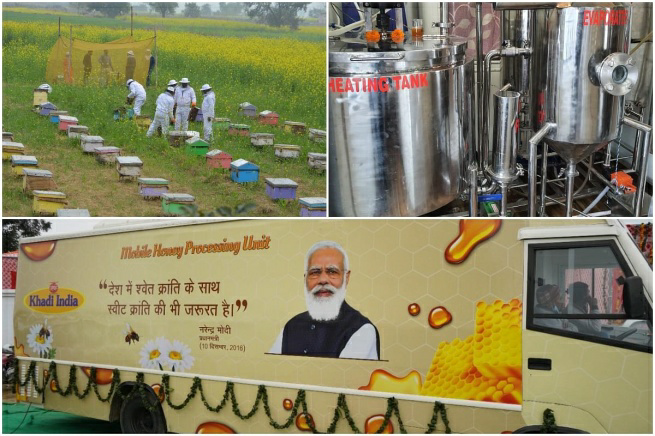MOBILE HONEY PROCESSING VAN

Disclaimer: Copyright infringement not intended.
Context
- KVIC launched the country’s first Mobile Honey Processing Van at Village Sirora in Ghaziabad, UP.
Details
Designed by:
- The Mobile Van has been designed in-house by KVIC at its Multi-disciplinary Training Centre, Panjokehra.
Features:
- This mobile honey processing unit can process up to 300 KG of honey in 8 hours.
- The van is also equipped with a testing laboratory, that would instantly examine the quality of honey.
Objective
- The Mobile Honey Processing Van comes as a major development under KVIC’s Honey Mission which aims at training beekeepers, distributing Bee Boxes to farmers and helping rural, educated as well as unemployed youth to earn extra income through beekeeping activities.
- In line with Prime Minister’s dream of “Sweet Kranti” (Sweet Revolution) though honey production, the KVIC has come up with this unique innovation to enable beekeepers and farmers to get fair price of their honey produce.
Other Honey Initiatives
Honey FPO Programme
- The Honey FPO Programme has been launched under the Central Sector Scheme for Formation & Promotion of new 10,000 FPOs.
- The task of creating these FPOs has been given to NABARD, Small Farmers’ Agribusiness Consortium, National Cooperative Development Corporation and NAFED.
- Through these Honey FPOs, NAFED will also work for promotion of beekeeping as an occupation for unemployed women and tribal populations and uplift their livelihood.
Honey Mission Programme
- The Honey Mission Programme was launched by Khadi & Village Industries Commission (KVIC), under the Ministry of MSME, during 2017-18.
- It is being implemented to promote Bee Keeping activities and provide self-sustaining employment opportunities among farmers, Adivasies and unemployed youth in rural India, especially in economically backward and remote areas.
- Under the programme, beneficiaries are provided with Bee Boxes, live bee colonies, tool kits and training.
National Beekeeping & Honey Mission (NBHM)
- Under National Beekeeping & Honey Mission (NBHM) schemeunder Ministry of Agriculture, scientific beekeeping is promoted for holistic growth of the sector, leading to income and employment generation, livelihood support to farm and non-farm households.
Scheme of Fund for Regeneration of Traditional Industries’ (SFURTI)
- Besides, under ‘A Scheme of Fund for Regeneration of Traditional Industries’ (SFURTI) implemented by the Ministry of MSME,traditional beekeepers are provided with sustainable employment by organizing them into clusters, and supporting them with new machineries and training.
Significance
Sweet revolution
- Sweet Revolution‘is a strategic step to emphasize the increase in honey production in the state, which can be a major contributor to doubling the income of the farmers.
- With the increase in income, the production of crops will also increase by 15%.
Purpose
- Providing employment by connecting the farmers of the state with bee keeping.
- To increase agriculture and horticulture yield and income of farmers.
- To make the state the leading state in the field of honey production.
- Children free from malnutrition.
- Production of quality honey.
- Honey beekeeping will change the lifestyle of small and marginal farmers and help in achieving the goal of increasing farmer’s income.
About KVIC
- The Khadi and Village Industries Commission (KVIC) is a statutory body formed in 1957 (During 2nd Five Year plan) under the 'Khadi and Village Industries Commission Act of 1956'.
- It is an apex organisation under the Ministry of Micro, Small and Medium Enterprises, with regard to khadi and village industries within India.
- Objective: It seeks to - "plan, promote, facilitate, organise and assist in the establishment and development of khadi and village industries in the rural areas in coordination with other agencies engaged in rural development wherever necessary."
- The commission has three main objectives:
- The Social Objective - Providing employment in rural areas
- The Economic Objective - Providing saleable articles
- The Wider Objective - Creating self-reliance amongst people and building up a strong rural community spirit.
- KVIC implements following schemes:
- Prime Minister's Employment Generation Programme (PMEGP)
- Interest Subsidy Eligibility Certificate (ISEC) Scheme



1.png)
